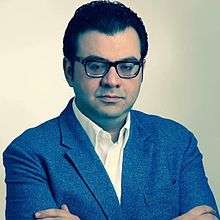Louay Almokdad
Louay Al-Mokdad (Arabic: لؤي المقداد; born 20 December 1982) is a Syrian-British politician and businessman. He was born in 1982 in Damascus, Syria.
Louay Almokdad لؤي المقداد | |
|---|---|
 | |
| Born | 20 December 1982 Damascus, Syria |
| Nationality | Syria, United Kingdom |
| Occupation | Politician, publicity |
Education
He studied in Damascus until high school, and graduated from the American University in Cyprus with a major in Political Science.
The Syrian Revolution
Being a Secular opposition member, he served as the spokesman for the Supreme Military Council of the Free Syrian Army and was also the political and media coordinator of the Free Syrian Army from 2012 to 2015.[1]
He was a member of the National Coalition for Syrian Revolutionary and Opposition Forces before his official resignation in 2015.
Political career
He is commonly known for his opposition to Syrian government and a powerful fighter against extremist Islamic groups such as the Islamic State of Iraq and the Levant and Al-Nusra Front through hundreds of interviews in Arabic[2][3] and international media.[4][5]
On 12 December 2012, Syrian government issued arrest warrants against Almokdad, Lebanese Prime Minister Saad Hariri and future bloc deputy Okab Sakr, accusing them of providing financial support for Syrian opposition groups.[6] Interpol rejected the Syrian government warrants. According to a memo sent by Interpol to its offices in Arab countries and around the world, the organization decided not to keep the arrest warrants in its database and will not cooperate with them based on its regulations as "it is strictly forbidden for the organization to undertake any intervention or activities based on political issues."[7]
Almokdad established several institutions which concerned itself with the political and media affairs of the Middle East, including the "Masarat"[8] Foundation, which is competent in Syrian, humanitarian and relief affairs, particularly with regards to fighting extremist ideologies which are among some of the conflicting factions in Syria.
References
- "Louay ALmokdad Resign from the "Coalition of the Syrian" opposition". Archived from the original on 28 December 2016. Retrieved 26 December 2016.
- Louay Almokdad د: الإتجاه المعاكس – هل تصلح روسيا كوسيط نزيه بين المعارضة السورية والنظام؟
- france 24: Dialogue with Louay Mokdad, political and media coordinator FSA
- FRANCE 24 English: Louay Al-Mokdad, Free Syrian Army spokesman
- Louay Almokdad In CNN
- Syria seeks arrest of Lebanese former PM Hariri and Almokdad and okab sakr
- "Interpol Rejects Interfering in Syrian Arrest Warrants against Lebanese Officials, FSA Member". Archived from the original on 31 December 2016. Retrieved 28 December 2016.
- Masarat paths Foundation Archived 30 November 2016 at the Wayback Machine Syrian Center for political coordination and media – courses of action team